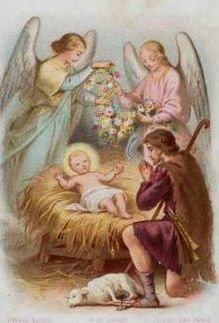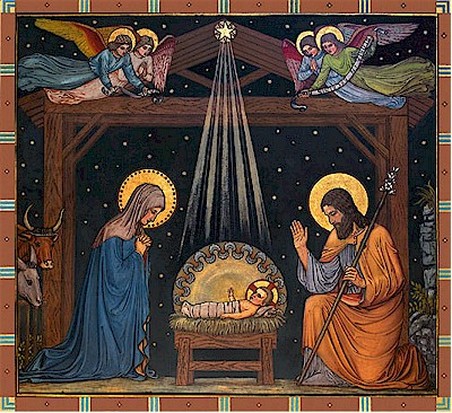
First Point — The crib in Bethlehem is a wonder of humility. Pride has ever been the source of the greatest misfortunes. Adam wishes to become like to God, and he is forthwith expelled from the garden of delights. The pride of Cain is aroused at the preference which God manifests for the sacrifices of Abel, and Cain becomes the murderer of his brother. The children of Noe construct a tower, which, they say, shall be a lasting monument to their greatness, and this act of pride is punished by the confusion of tongues. Even now, pride begets dissensions, hatred, and wars which desolate empires, and schisms which rend the Church. Since pride is the greatest of all the vices, it was necessary to apply a remedy to it at once, and what more efficacious remedy can there be than the humility of a God? The Divine Word offers Himself for our redemption by saying to God His Father: "Holocausts for sin are no longer pleasing to Thee. Behold Me, Lord, Thy eternal Son, united to a mortal body; behold Me, the heir of David, poor, forsaken, and reduced to the horrors of misery. For a throne, I have a manger; for a palace, I have a stable; for a royal mantle, I have swaddling-clothes, and for courtiers I have some poor shepherds." What humility! Can you ever comprehend all its greatness? Know it well, nothing would have been easier for this Child than to have been born in a superb palace, of a celebrated or renowned princess, and in the midst of a court eager to serve Him. He could do all this, since the earth, with all that it contains, belongs to Him. "All things under heaven are mine." But has not this example flattered our vices instead of extirpating them ? Is it not an excuse for our pride, instead of a remedy? Men love riches, as they are the source of honors which are often as vain and fleeting as their origin; but the Saviour, by His birth in a stable, has taught men to love poverty. Men attach much importance to an illustrious origin; but Jesus is born of a daughter of David and the world ignores Him; and this royal daughter, who is a spectacle for angels, is unable to find in Bethlehem a friendly hand that shall assist her in her poverty. Men are also proud of their studies and their science; they blush to be found in contact with people without education or instruction; but the God of the manger calls about Him simple and ignorant shepherds. Of what then shall men henceforth be proud? How can a proud man dare to look at the crib? He who possesses every perfection consents to be reckoned as nothing. He who fills all places by His immensity is compelled to seek an asylum in a stable. He before whom all men are as small insects becomes like to them to save them. Can there be an abnegation like to this? O my humble Master! who shall not be instructed by this mystery, when he sees Thee treated as the meanest of men, rejected by every one, relegated to a poor dwelling, and surrounded by vile animals? Why dost Thou hide Thyself under a veil so unworthy of Thy greatness? Thy love answers: it is to confound the pride of men. O man, you are but the dust of the earth, still you dream only of grandeur and frivolity, while your God conceals Himself under the form of a slave. You are but a plaything of vanity, and constantly sigh for new ornaments; while your God is naked and so poor that His mother can scarcely find wherewith to cover His sacred body. If, after this wonder of humility, you still seek to exalt yourself, it would be indeed a wonder, and it would be a prodigy of pride.
Second Point — The crib is a prodigy of goodness. Let us suppose that the only son of the greatest king of the earth, unmindful of his rank, his birth, and all the pleasures of the court of which he is the brightest ornament, should come in the midst of us and share the labors of the most unfortunate; and let us suppose that, wishing to solace them as far as he can, he should ask of his father to charge him with the obligations of all, and to fulfill these obligations he should expose himself to the rigors of the seasons and the fury of a thousand enemies, would he not be a monster, worthy of our anathemas, who should not love such a generous prince? And who is this Son of the great King? He is the Word of God, eternal, equal to His Father in everything, a Father who is truly worthy of the name, and who places in His Son all His delights. The human race, lost by its own crimes, was about to perish. The hand of the Most High was prepared to hurl His thunders against men, but His Son, this merciful Son, restrained Him, and His anger is changed to tenderness. But a sacrifice is necessary. Well, He shall be the Victim. The crib in Bethlehem is the altar on which He is offered. O infant God, how dear Thou art to me! The tears Thou didst shed are for me; the sorrows Thy delicate members experience have been occasioned by me, and still Thy charity makes all these sufferings light and tolerable. To understand this prodigy of goodness well, we should meditate on the sorrowful circumstances which accompany the entrance of Jesus into the world. He is born in the middle of a winter night, — the cold seizes His weak body, — His mother looks about for garments to cover Him, and finds only some poor clothes which scarcely serve their purpose. He is born to be the Saviour of men, and men despise Him and reject Him from their society as the last of all men. Hardly is He born than He at once begins to exercise the functions of a Saviour; His tears are falling in the manger. Do not suppose that the tears of the Infant Jesus come only from a natural cause, as the tears of other children. No; His soul, reasonable at all times, sees all the crimes of men. He weeps for men, and His tears are the tears of penance. And you are the cause of these tears, you unthinking Christians, who, by refusing to receive Him in the sacrament of His love, close the door of your heart against Him, as on the day of His birth the rich closed the doors of their houses against Him. You are the object of those tears, worldly young men, who are plunged in pleasures while He endures for you the greatest sufferings. You, slaves of vanity, you are the objects of those tears, you who seek the esteem and praise of men while He is born in misery and lives in opprobrium for love of you.
O my divine and amiable Master, it is indeed a great prodigy that Thou shouldst come to me and testify so much love for me; but it is a prodigy greater still that I should acknowledge Thy love so little. After all that Thou hast suffered for me, should I find it too hard to suffer something for Thee? Good Jesus, unveil to my heart the mystery of the crib at Bethlehem, make me understand well its divine teachings, that, through love for Thee, I may know how to suffer and be humble, since Thou hast suffered and wast humiliated through love for me.
Source: Short Instructions for Every Sunday of the Year and the Principal Feasts, Imprimatur 1897



 RSS Feed
RSS Feed